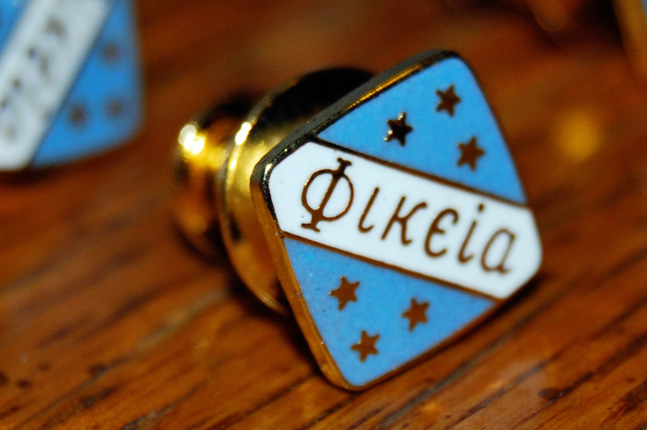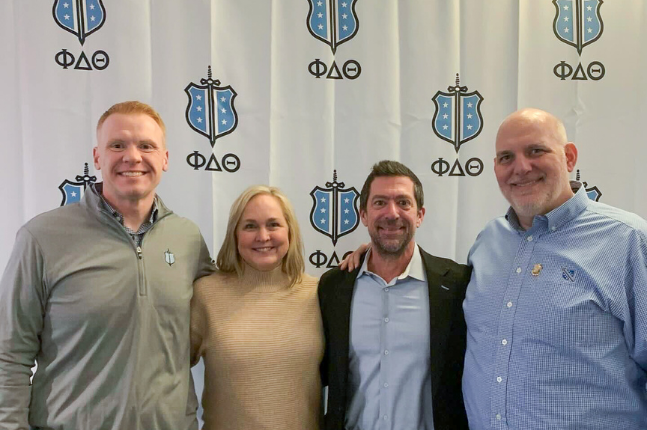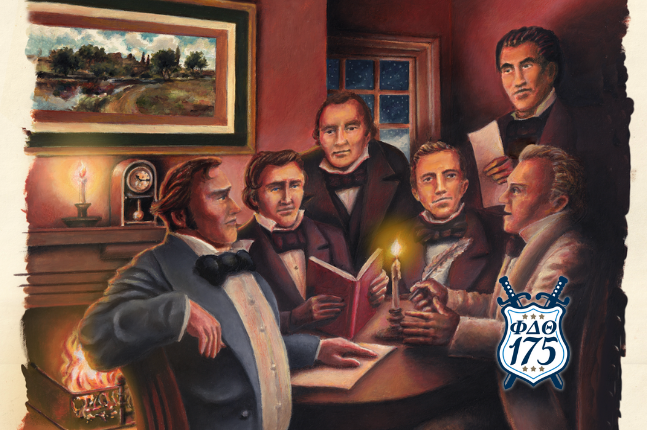By Dr. Mark Pleiss, Washington & Jefferson ’11
Recruitment and pledging are where we develop the next generation of fraternity men. We hope to select and retain those individuals who exemplify our Cardinal Principles of Friendship, Sound Learning, and Rectitude, as well as live up to the standards set in The Bond of Phi Delta Theta. Ideally, the process of pledging involves taking college boys and helping them grow into fraternal men: a cycle that repeats itself each semester on many college campuses. While we should benefit from new members joining our chapters, we also take on the responsibility of assisting the growth of these individuals into the young fraternity men that we will welcome into the brotherhood: the family of Phi Delta Theta. Our brotherhood serves as a form of social support, a factor that has long been proven to support mental health in individuals.
Fraternities provide the opportunity to choose this new family: something that many people do not experience until they step onto a college campus on the first day of freshman year. When we extend a bid and welcome someone to join our fraternal family, we often assume that they are similar to us, which is highlighted by their ambitions to join our chapter. However, we must remember that the fraternal family is different in several important ways. We do not have the years of shared history that has connected us with our family of origin, and we may not be aware of the many events that an individual has experienced before reaching our doorsteps and signing a bid card. Simply put, we may not be aware of many of the key events, good or bad, that have shaped this person on their path to joining our Fraternity.
GOAT, a movie pending national release that is based upon the life experiences of Brad Land before and during his time at Clemson University, highlights how little we may know about our brothers’ and Phikeias’ personal histories. Brad Land was brutally attacked and nearly killed when his car was stolen by two strangers whom he thought he was giving a ride home. Mr. Land’s kind gesture ultimately led him to becoming a victim and survivor of extreme violence. Later, his traumatic experiences are re-triggered during his pledge process at Clemson, the hazing that he endures brings back memories and feelings of the night that he nearly lost his life. This movie provides our brotherhood with an opportunity to examine our own pledge process and how it builds our fraternal family.
Understanding an individual’s mental health begins by examining how someone functions physically, cognitively, and emotionally as compared to their peers. We often assume that if we cannot see a physical wound that the person is healthy and can tolerate any stress that they may encounter. Unfortunately, we may be unaware of the traumatic events that someone may have experienced before reaching the point of seeking membership into our Fraternity. People may have experienced great loss in their life from losing parents, siblings, caregivers, and/or friends to death or forced separation. Some individuals may have survived being bullied, may have been victims of random acts of violence, in addition to a wide range of potential physical, mental, and emotional traumas. Even the most mentally healthy individuals can have vastly different responses to traumatic events and stress, and sometimes these responses are unknown even to the person until they are subjected to later stress, such as experiencing hazing during the pledge process.
The connection between joining our fraternal family and hazing can truly become problematic, especially in the context of asking someone to trust us to help them become a fraternal man. Engaging in hazing practices places a barrier between the active members and pledges, reducing them to “less than” a brother or sometimes even less than a human being. While we verbalize a message of embracing one another, our actions communicate rejection. Hazing is often framed as a way of having individuals prove that they have earned their membership into an organization. Common hazing practices today have shifted from physical hazing to mental and emotional hazing. Instead of paddling, pledges are deprived of feeling safe and connected, and may even resurrect past traumas in order to earn the family and support that fraternity has to offer.
A family can be constructed and defined in many ways. Those who participate in hazing practices fracture the family that we wish to build. Having a member earn their membership through participation in chapter activities, such as philanthropy, leadership development, community services, attending sporting events, intramural athletics, alumni functions, mixers, and homecoming builds the family into a strong one. Such activities help these individuals prove they are becoming fraternity men not only in the presence of chapter brothers, but also the community that we live in on our respective campus communities. Those that do not demonstrate an ability to practice and demonstrate characteristics we associate with our high standards set for membership should not earn the right to be initiated. The stronger the family we build through mutual respect and unconditional positive regard, the more likely these members are to come when we personally need our fraternal family: When we experience our own hardships as we go through life.
Becoming the greatest version of ourselves involves adding those who can support us during times of high stress. Regardless of someone’s mental health, hazing is a process that not only tears down an individual’s ability to function successfully in our fraternal family, but also weakens it in the long run. Those members who grow together through the attainment of mutual goals, such as bettering their chapter on campus, winning awards, intramural or collegiate championships, and bettering their community, are likely to develop the family that is enduring and supportive even beyond the years we spend as undergraduates on our campuses.
Dr. Mark E. Pleiss was initiated into the Pennsylvania Gamma Chapter of Phi Delta Theta in Spring 2008 as Bond #1255. He graduated from Washington & Jefferson College with a BA in Psychology and a minor Sociology in 2011. While at W&J, he served the chapter in several roles, including president. After graduation, Dr. Pleiss began a doctoral program in clinical psychology at IUP, while serving as a member of the Pennsylvania Lambda CAB. He graduated with his Masters and Psy.D in Clinical Psychology from IUP. Currently, Dr. Pleiss serves as the Upsilon South Province President, and has been a faculty member for several Kleberg Emerging Leadership Institutes and the Presidents’ Leadership Conferences. Additionally, he is the Mental Health Expert on the Education Committee. He works for the Federal Bureau of Prisons as a Drug Abuse Program Coordinator at the Federal Correction Complex- Hazelton, in West Virginia. He is also a fan of professional and college football, and enjoys hiking, cooking, and traveling to new cities.





